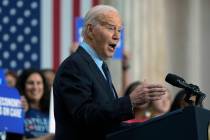Question 1 questions
This month's election featured some surprising and predictable results, but perhaps none more curious than the easy passage of State Question 1. Voters approved the constitutional amendment by an 8-point margin, granting the Legislature the authority to call itself into special session.
The question had no organized campaign in support or opposition. It did not command a great deal of press coverage. If voters lack information about a ballot question or don't fully understand it, they typically vote no.
Prior to the passage of Question 1, only the governor could call the Legislature into special session. Nevada voters previously had amended the state constitution to limit regular legislative sessions to 120 days every other year. It was a vote to limit lawmaking. But now lawmakers can convene themselves whenever they want, however often they want, provided two-thirds of the members of each chamber agree. That same two-thirds threshold is required to raise taxes and override a gubernatorial veto.
Democratic Party lawmakers hold a 27-15 majority in the Assembly, one seat short of a two-thirds supermajority. Democrats also control the Senate, but only by a single seat, 11-10. Given demographic trends and the Democratic Party's dominant political machine, it's not unreasonable to believe the party might capture legislative supermajorities by the end of the decade. That would give them the ability to raise taxes unilaterally, regardless of who's governor.
Yet the public overwhelmingly rejected tax increases last week. Clark County Question 2, which would have raised property taxes to fund school renovations and construction, barely won support of one-third of the electorate.
So why would the public reject tax increases yet approve a question that eliminates a barrier to tax hikes? Passage of Question 1 was supported by state Democrats and their allies. Perhaps Question 1 rode Democratic coattails to victory, with voters believing there was no immediate fiscal cost of approval - unlike the tax questions.
Time will tell whether they're correct over the long term.

















